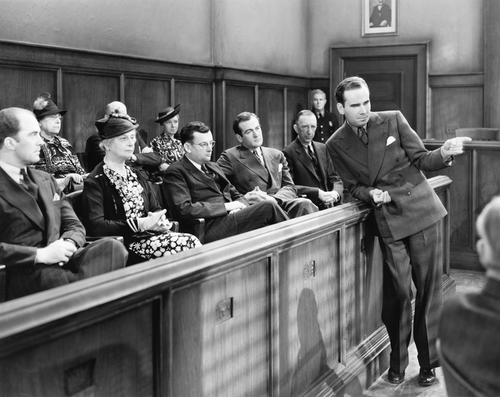A prosecutor opened the economic espionage trial of Walter Liew on Wednesday by waving at jurors a key that he alleged opened Liew’s safe deposit box containing industrial secrets stolen from DuPont.
Assistant U.S. Attorney John Hemann led jurors through an almost cinematic scene that culminated with FBI agents confronting Liew and his wife, Christina, with the key found during a search of their Orinda, California home. Liew sat at the defense table during opening statements in San Francisco, as did co-defendant Robert Maegerle, a former DuPont employee.
According to Hemann, when agents asked about the key, Liew instructed his wife in Mandarin as to how to respond. Eric Bozman, an FBI special agent who participated in the search of the Liews’ home, testified that the couple exchanged “a very dwelling look” when agents asked about the key. Walter Liew then spoke to his wife in Mandarian, directing her to answer, “You don’t know, don’t know,” Bozman testified. Christina Liew then told the agents: “I don’t remember” what the key opened. What the Liews apparently didn’t know is that Bozman also understands Mandarin (he identified himself as Caucasian) and understood what Liew allegedly told his wife to say.
Then, Hemann told jurors, Christina Liew drove from the home to a bank—trailed, without her knowledge, by FBI agents—where she asked bank personnel to open the safe deposit box. The bank did not immediately accommodate her, so she drove to a hotel where she met with a group of Chinese businessmen from the Pangang Group allegedly involved in the plot to steal DuPont’s secrets for building a titanium dioxide plant in China, Hemann said.
While searching the Liews’ home, FBI agents simultaneously raided the Delaware home of Maegerle. There they found confidential DuPont blueprints, Hemann said.
“The searches will prove to you beyond a reasonable doubt that Walter Liew and Robert Maegerle used confidential information to give themselves advantage and to give the Pangang Group an advantage” in making titanium dioxide, Hemann said in his opening statement. Among the documents recovered from Liew, he said, were DuPont documents explaining how to build a titanium dioxide factory and internal DuPont documents on the process of making the white powder used to color everything from toothpaste to paper. That process, Hemann said, “is dirty and dangerous and difficult and DuPont figured out how to do it in a way that was commercially viable”—methods protected by trade secrets, he said.
But in his opening remarks, Liew’s defense counsel Stuart Gasner disputed that the process of making titanium dioxide with choride even qualified as a trade secret. There are thousands of patents covering the technology, many of them expired, he said. Gasner showed jurors what he said was a 1949 textbook containing a chapter on the process. “This is an area of technology that a lot of people know a lot about,” he said.
“Sure, they [DuPont] deserve a lot of credit for inventing particular aspects” of manufacturing titanium dioxide with chloride, he said. But “time ran out on them” as their patents expired, and “they tried to go into overtime using trade secret law in a way it wasn’t intended to be used.”
Moreover, he said, Liew carefully researched both the technology and the law governing whether it was protected by trade secrets. Liew did not believe he was using anyone’s secrets, Gasner said. Maegerle had left DuPont 14 years before he started working with Liew on titanium dioxide and believed he was well beyond the period covered by any confidentiality agreements, he said.
As for the many documents found in Liew’s possession, Gasner said they represented a tiny fraction of the data on the computers and servers searched by government agents. Gasner showed the jury a slide depicting the five terabytes of data on those devices—information that, if printed on standard paper, would form a stack so high it would nearly reach a satellite. Prosecutors, he said, were focusing on a “tiny, tiny fraction of the work” they found on the devices, he said.
In his opening, Maegerle’s lawyer Jerome Froelic also attacked the government’s contention that DuPont’s recipes for making titanium dioxide with chloride were protectable trade secrets. Froelic acknowledged his client used information gleaned while he was employed by Dupont. “But it was information Robert Maegerle believed was not trade secret, had been revealed by DuPont and that he believed was no longer covered by his confidentiality agreement,” the lawyer said.
Emphasizing the significance of the safe deposit box key to the prosecution, the government returned to that issue by calling Bozman as its first witness. Bozman testified he was assigned to watch the Liews while agents searched their home. While watching them, another agent asked the couple about the key.
Gasner suggested that the FBI was trying to deceive the Liews into saying something incriminating by assigning them a Caucasian minder, whom the couple would not suspect spoke Mandarin. “You don’t look Chinese. Wasn’t that part of the plan?” Gasner asked. Bozman denied there was any such plan.
Maegerle’s attorney also tried to attack Bozman’s credibility with a series of questions about his hearing. Bozman testified he was born with a collapsed ear canal and had a hearing impediment until surgery at age 5. But under questioning from Assistant U.S. Attorney Peter Axelrod, Bozman said he had passed four FBI hearing tests.
Bozman was confident and congenial on the stand, and appeared to keep the jury’s attention.
Prosecutors called two other FBI agents who were involved in trailing Christina Liew during the search of her home: Special Agent Kieu Lefevre, who testified that she staked out the home in the hour before the raid and afterward; and
Special Agent Kenneth Karch, who said he too trailed her after she left the home, and for several weeks afterward.
The government plans to call two other agents involved in the search on Thursday. The trial is expected to last for seven weeks.
 Peter Keisler. Photo by Diego M. Radzinschi/ALM
Peter Keisler. Photo by Diego M. Radzinschi/ALM









